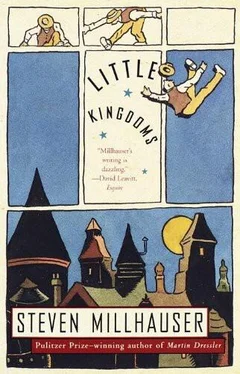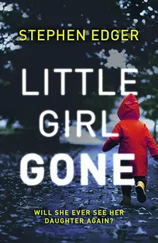When Cora returned, holding a tray of cheese and crackers, she bumped open the screen door with her hip. The slight immodesty of her suddenly outthrust hip, the momentary awkwardness of her body, the lamplight from the front hall around her darkening form as she stepped onto the porch, all this excited Franklin and made him impatient for Max to go up to bed, or dissolve into mist, but he kept sitting there and sitting there; and after midnight, when they had all moved into the parlor, Cora at last rose with a look of weariness and said decisively: “Now I want you and Max to stay up and talk, you hear?”
Franklin, who had begun to rise, looked for a sign from Cora, who had already turned away. A warm, drowsy feeling came over him, as if he had not slept for a long time. “I’ll be up in a few minutes,” he said, sinking into the soft armchair; and the yellow lamp shade, the cry of the crickets, the shadowy wallpaper with its trellises of pink roses, his friend sitting in a chair with one leg hooked over the arm, all seemed part of some drowsy, peaceful mystery he was on the verge of understanding. He looked at Max and felt an odd burst of gratitude that he should be sitting there, far from the city, in the dead of night, and all at once he began telling Max about his father’s grave voice in the darkroom, the pictures emerging mysteriously from the paper in the developer tray. He spoke of the dime museum, the strangeness and odd comfort of it, and about the advertising posters and how it was all somehow connected with the magic of the darkroom. Suddenly Franklin felt a wild thrill of exhilaration, mixed with fear, and standing up he said, “I want to show you something.”
The two stairways, each with its landing, seemed much too long, as if he had taken a wrong turn somewhere, but when he pushed open a door he saw the familiar study, the jar of penholders on the desk, the glass-cased clock. Max bent intently over the rice-paper drawings and asked precise questions. Franklin then showed him a little invention that he had modeled after a penny-arcade mutoscope: a metal cylinder, turned by a crank, was fitted with slots that held the cardboard-backed drawings. When you turned the crank, the drum of drawings turned. A metal rod was attached in such a way that each drawing struck it and was held for an instant before being released. And in the viewer the pictures moved — at first too quickly before he found the right rhythm of cranking, then flickeringly, waveringly, but unmistakably. In a hall of the dime museum the knife-thrower with his cape and mustache was lifting the little girl with the big, frightened eyes from the circle of spectators. The words HELP!! HELP!! appeared on a title card. Franklin invited Max to look through the viewer, and as he continued turning he saw the pictures moving in his mind: the knife-thrower tied the struggling child to a wheel and with a single sharp finger set the wheel spinning. Reaching back for a row of knives he began flinging them at the blurred wheel as Franklin stopped turning.
“Golly Moses,” Max said, shaking his head admiringly as he took the crank and continued to turn.
“That wheel cost me a month of work,” Franklin said.
Max looked sharply at him. “You realize you’re out of your mind, don’t you? A raving madman in a padded cell. You do know that, don’t you? You do all the drawings yourself? I know a man who—”
“I’d rather be out of my mind than in my mind,” Franklin said, and felt suddenly tired and immensely unhappy and exhilarated all at the same time. If he spent four hours a night six nights a week he ought to be able to finish the drawings by late fall or perhaps December at the latest, assuming that his comic strips didn’t spill over into the evenings, which they often did. The animated cartoon was about to enter a new sequence, in a new hall of the dime museum, where the tattoos on the tattooed man came to life and danced a wild dance around the terrified girl, and he would need all his powers of concentration to get the motions exactly right. “You see,” he said to Max, who for some reason had climbed onto the desk and then onto the top of the door frame, where he sat crouched like a gnome as dark wings grew from his shoulders; and opening his eyes Franklin could not understand the bright dawnlight pouring through the windows of his bedroom, while somewhere far away a cup was rattling on a dish.
“I understand that the motions have to be exactly right,” Max was saying a few days later in the faded armchair in Franklin’s office. “You’ll grant I’m not precisely an idiot. I’m arguing that you can get them exactly right and also save a devil of a lot of time. You don’t want to spend the rest of your life working on a four-minute cartoon, do you? Or do you? This new process—”
“But I don’t want to save time,” Franklin said irritably, although as he spoke he realized it wasn’t entirely the truth. The mechanical retracing of every drawing was utterly exhausting, and if he could draw each stationary background only once, placing over it a transparent sheet of celluloid on which only the moving portions were drawn, then he had no objection to the new technique. But the cartoons he occasionally went to see did not inspire confidence. It seemed to Franklin that the new studio-produced cartoons were all too intent on saving time; the cel system didn’t seem to encourage the kinds of detailed background one might have expected, but instead produced simple backgrounds consisting of a few boring props: a horizon line, a rock, a bushy tree. Besides, his own backgrounds were themselves continually changing in small ways — his dime museum was alive in all its parts, and in the climactic sequence an entire hall, with its pillars and archways, was going to come alive. Besides, the cel process was patented and required a license, and the public nature of applying for a license violated his desire for absolute secrecy. Besides, though Max was trying to be helpful, Franklin didn’t want to be helped. Besides, he had a splitting headache.
“You own a telephone,” Max was saying. “You insist on drawing with a Gillott 290 pen point. To be consistent you ought to bang out messages on a drum and draw cartoons with the sharpened tip of a goose feather. No, don’t bother to defend yourself, I don’t have time. The Troll’s been riding me again. He called me in for a little chat the other day. ‘Good work,’ says he. ‘But look here, Horn — in this corner — is it a dog, or is it a cat?’ I look at the corner. It’s a cat, with whiskers. I ponder. Scratch my head. Try to see a dog. It’s still a cat. Always was a cat. It’s pure essence of cat. I look old Alfred straight in the eye. ‘I believe it’s an elephant, sir.’ Really, sometimes I think old puddingface fails to appreciate my sense of humor. If he wants me to draw his damn cats for him then let him pay me a living wage. I’d rather fix drains in Flatbush. Tell your daughter I’m madly in love with her.”
Toward the end of the summer Franklin again invited Max to Mount Hebron, this time with a new misgiving: he feared that the second visit could never equal the freshness and surprise of the first. Cora, too, seemed to anticipate disaster. She was restless and fretful, wondered what she could possibly serve for dinner, changed her dress twice before lunch, asked Mrs. Henneman, the housekeeper, to clean the mirrors and polish the silver, and scolded Stella for always being underfoot. Franklin, who had been staying up till midnight to work on his newspaper strips, now saw the weekend as a lost stretch of time for his animated drawings and cursed his bad luck, and Max, and life in general, and above all his exasperating shirt collar, which kept riding up on his neck — and then, as if he had arrived unexpectedly, Max was there, sweeping them all into his gust of talk, rescuing them, it seemed, from a ruined afternoon. Cora had planned a picnic at the top of the wooded slope above Mount Hebron. Sitting in the sun-speckled shade of the picnic table, biting into his cold chicken leg with eyes closed in pleasure, raising his glass of red wine into the brightness of the sun, Max looked down at the town, at the sunny brown river, at the wooded hills of the far shore, and said that his idea of bliss would be to own a piece of land on those hills, across from Mount Hebron. “Matter of fact,” Franklin said, stretching out one arm in a long, slow yawn, “there’s land for sale. People buy, sometimes build.” Cora said there was a real estate agent on River Street and two more in the next township. Max asked if they would accept an IOU, and wondered if a real estate agent could supply him with a wife. After lunch, Max proposed a hike in the woods; and as he led them along leaf-strewn paths he stopped from time to time to point at something and say to Stella, “Is that a lion?” or “Those are very peculiar-looking telephone poles.”
Читать дальше












